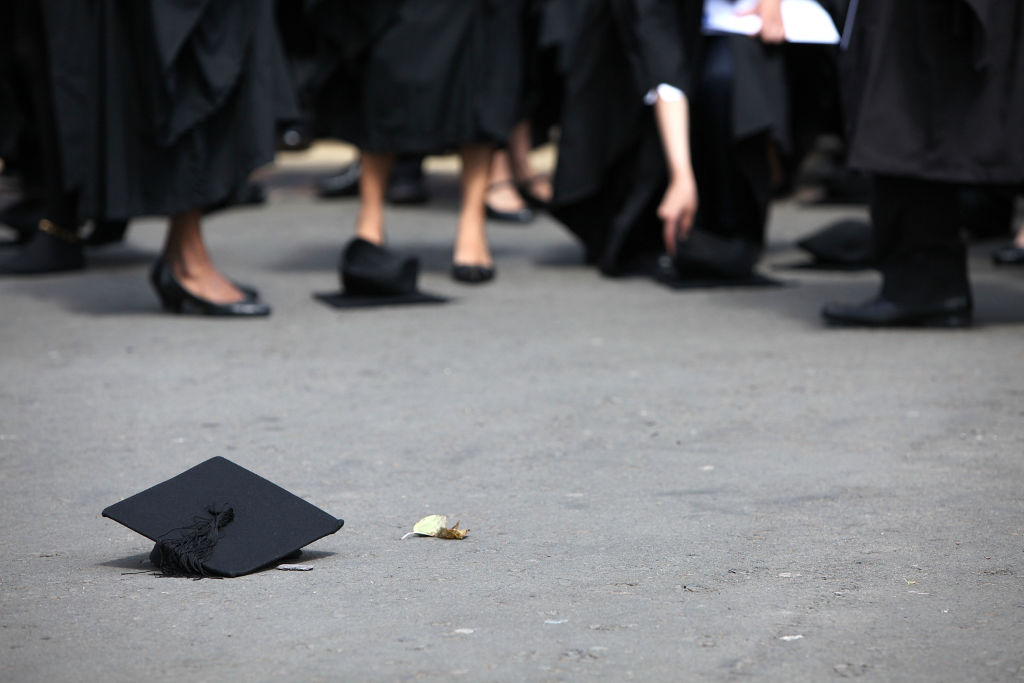The decision to scrap personal statements shows up our university system for what it really is: the priority is no longer about educating students, or academic endeavour, but expansion for expansion’s sake.
Ucas (the Universities and College Admissions Service) plans to replace the current applicant essay with a survey. This will reportedly ask taxing questions such as why applicants are motivated to study a particular course, why they are ‘ready to succeed’ and any context for their academic achievements – or lack thereof – so far. The justification? That the status quo is unfair on those students without access to ‘high-quality advice and guidance’. Yet the decision to get rid of personal statements from the university application process will erode standards and only makes the case for total reform of the sector stronger.
It’s no surprise that pupils at leading private schools receive more application help than state school students from poorer homes. The private school I went to provided me with plenty of advice, and I wrote up seven or eight drafts of my personal statement before it was finalised. My Oxford contemporaries who got in without such help deserve more credit than me – even if being a public schoolboy at Oxford now looks to be an increasing disadvantage.
But just because the current personal statement system can be unfair, it doesn’t mean replacing it is wise. More than eight in ten university applicants surveyed by Ucas found the current application process stressful; 79 per cent found it difficult to complete. This should be welcomed: stress and difficulty are natural parts of a process designed to test candidates’ ability to communicate subject aptitude. That Ucas wants to get by without them shows how little importance our universities now place on studying and academics.
This week’s announcement is the latest sorry symptom of a sick university system
Tony Blair’s dream of more than 50 per cent of school leavers going to university has now been realised. That represents a tenfold increase in the number of people taking degrees since the 1980s. This is despite English 16–24-year-olds being less likely to be numerate and literate than their parents and grandparents. It’s not higher academic standards, though, that are responsible for these increased student numbers over the decades, but a broken business model.
Rampant grade inflation at school has bedded in over a number of years. Even before the pandemic, A and A* grades almost doubled at A-level, and more pupils than ever were receiving top grades. This has fed through into universities. By last summer, four in ten graduates were receiving a first; in particular, the number doing so after achieving three Ds or lower at A-level had soared. This is hard to square with a generation struggling to read and write properly. Instead, it shows that what students learn at university has increasingly little bearing on the grades they are given. The so-called ‘graduate premium’ is increasingly meaningless in an over-saturated market.
Who is responsible for the mess the university system finds itself in? Successive governments share the blame. Margaret Thatcher put universities on track to becoming businesses first and places of learning second. John Major renamed the polytechnics to create dozens more universities overnight; Tony Blair put numbers before standards. The coalition’s tuition fee hike meant more students racked up more debt doing courses of decreasing value.
All this has done is create one big vicious cycle. An ever-expanding undergraduate population has forced universities to borrow money for increasing capacity years in advance. To attract students, they want to be as high up the league tables as possible. This incentivises them to provide the best grades possible – whatever the quality of work produced. The intellectual quality of students entering the system is becoming increasingly irrelevant. Who needs a personal statement when the logical outcome is that one day everyone will get firsts?
This model cannot be sustained. Rising interest rates mean the university debt bubble will become harder to finance. With increasing numbers of graduates unlikely to ever pay off their tuition fee loans, this means a bigger burden on the taxpayer. By the 2040s, it has been predicted that this could cost the Treasury well above 10 per cent of GDP. This cost will only rise if undereducated graduates contribute less to the economy than government modellers expect.
What, then, can be done about this? The university system has to be overhauled, grade inflation stamped out in school, underperforming universities closed. Personal statements should be retained and the application system made more rigorous. Undergraduate numbers must fall – draw a line: no university places for anyone receiving anything under a B or C. Those institutions that survive should be funded by central government, private donations or fees, rather than a debt mountain.
Neither the Conservative or Labour party wants to change the status quo. The Tories may rail against campus wokery, but they have no desire to reform a sector that provides one of the country’s few growing industries. A conveyer belt of arts graduates also conveniently provides Labour with a substantial chunk of their future voter base.
This week’s announcement is the latest sorry symptom of a sick university system. Whether you believe a degree is worthwhile for its own sake, or just a necessary step towards a job, this constitutes a tragic waste of human potential. The university blob’s unwillingness to wake up to their delusion of a thriving university system means the problem of falling standards, meaningless grades and ballooning debts will only grow. It will be students – and the taxpayer – who pay the price.







Comments